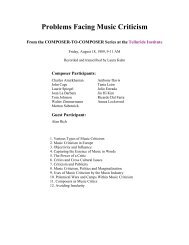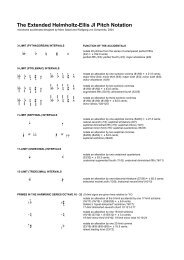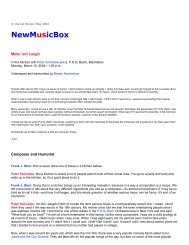Sixth World Symposium on Choral Music ... - NewMusicBox
Sixth World Symposium on Choral Music ... - NewMusicBox
Sixth World Symposium on Choral Music ... - NewMusicBox
You also want an ePaper? Increase the reach of your titles
YUMPU automatically turns print PDFs into web optimized ePapers that Google loves.
New<strong>Music</strong>Box May 2003<br />
something c<strong>on</strong>cerning compositi<strong>on</strong>. And then I try to order things around that, if I can. That's<br />
what I do.<br />
MOSES HOGAN: That's a beautiful story. In my heart I am organized! You know life is everchanging.<br />
You ask yourself a couple of questi<strong>on</strong>s about the creative process. You say to yourself,<br />
"Well, why do I compose?" That's the first questi<strong>on</strong>. Many times I will live or think about a<br />
piece for m<strong>on</strong>ths. It depends <strong>on</strong> how quickly the commissi<strong>on</strong> is, or how quickly the resp<strong>on</strong>se to<br />
it. But there is nothing about music that there is ever absent from anything that I do—as I am<br />
listening to people <strong>on</strong> the street, or I am in the supermarket listening to the Muzak TM in the<br />
background; I'm analyzing it. And so it is always present with me. What makes you a composer?<br />
What it is that makes you want to document what it is that you're documenting. You know, a<br />
pers<strong>on</strong> is a result of his/her own musical experiences. And so you have various influences that<br />
will make us who we are. And so <strong>on</strong>ce you get in touch with that initially, there is never a<br />
problem—When it is time to compose, the music will come to you. I believe that this is the<br />
process, and whether I do it every day for 15 minutes, or if I d<strong>on</strong>'t actually sit down for another<br />
2 weeks or until late at night. Sometimes I walk al<strong>on</strong>g the street and I just feel the rhythms, or I<br />
just hear this idea—not necessarily dashing it down, but sometimes I just need it to stay with me,<br />
and I know that when I get to the piano or when that time is appropriate for me to finish that<br />
compositi<strong>on</strong> it will come out. So there is no regular schedule. <strong>Music</strong> is always present with<br />
every thought, and even if I haven't had a minute <strong>on</strong> a compositi<strong>on</strong>, and we are talking about<br />
something two years down the road, I'll start <strong>on</strong> it really the minute we start talking about it.<br />
When it comes out a year from then, but I believe it has taken all of that time to come to fruiti<strong>on</strong>.<br />
LINDA HOESCHLER: I will ask Libby and Moses to make some final comments, and then I am<br />
sure they will be able to stay a few minutes afterwards to answer pers<strong>on</strong>al questi<strong>on</strong>s. I would<br />
like to say that we have two extraordinary composers here who are articulate. They are both very<br />
successful. But having worked with hundreds of composers in my work and in my private life of<br />
commissi<strong>on</strong>ing, the composers are generally very easy to work with. In fact, I d<strong>on</strong>'t think I have<br />
ever worked with a difficult composer. They are articulate. They are, I think, easy to work with<br />
because they can explain what they are doing. They are used to having some parameters, and I<br />
encourage you all to try to work with a composer. It is <strong>on</strong>e of the great joys I think you will have<br />
in your life to experience something new. This is not about getting married. This is about a new<br />
piece of work. I was thinking of <strong>on</strong>e commissi<strong>on</strong>er whom I sent to work with Libby who I think<br />
was difficult to work with, and Libby handled it quite well. But because there was a fear… Not<br />
all parties succeed. But the joy in creati<strong>on</strong> and, I think, understanding what the artist is thinking<br />
about, and then the artist doesn't exist without you who literally give voice to the artist's work,<br />
this is also a great joy, working with each other. We heard in the beginning about what Moses did<br />
to work with the choir from Michigan, and Libby with the Japanese choir. How they worked <strong>on</strong><br />
the piece together, and how you get others to understand what is going <strong>on</strong>, and that is the great<br />
joy of a commissi<strong>on</strong>. Not just doing standard repertoire. And I think if you can involve private<br />
commissi<strong>on</strong>ers in this and get them to experience that joy, so that you are truly creating a historic<br />
occasi<strong>on</strong>, not just a program of pieces that everybody has heard <strong>on</strong> recordings over and over<br />
again. We have gotten so much into music wallpaper here. I really urge you to take that chance.<br />
Composers’ Dialogue #1, 08/06/2002





